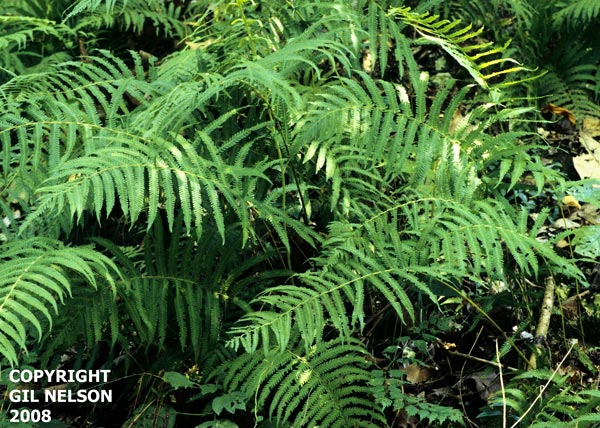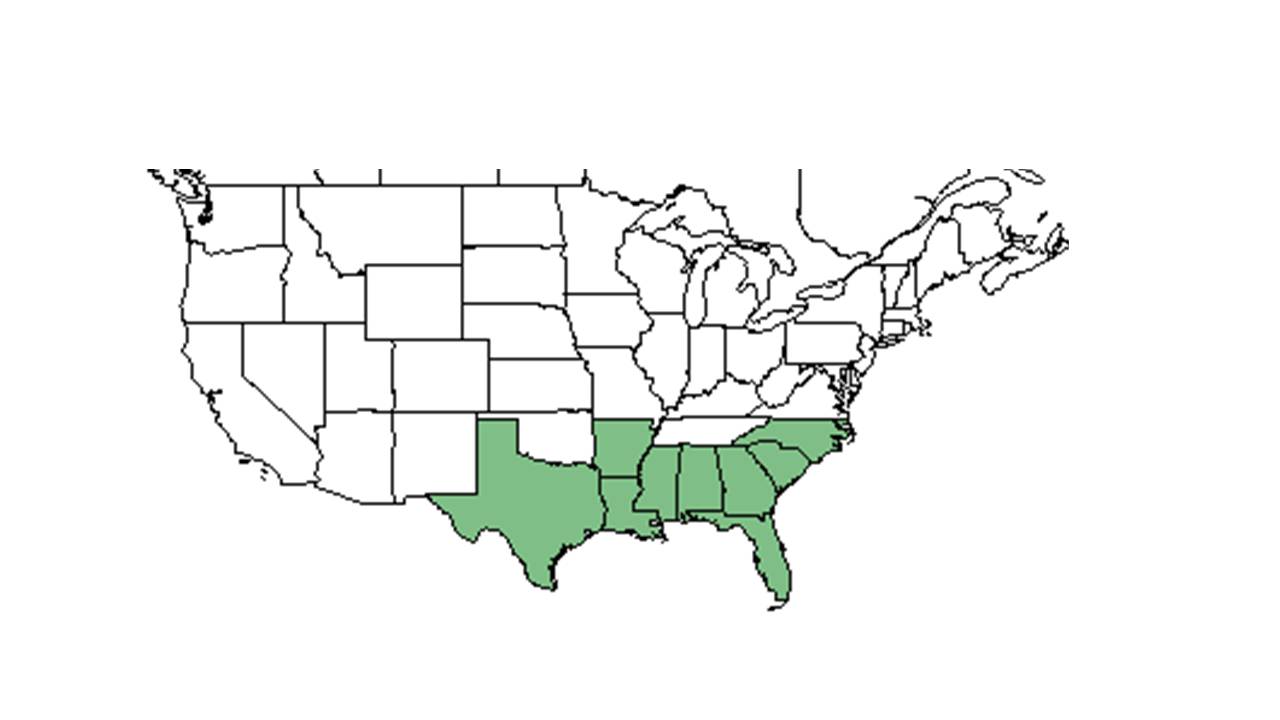Difference between revisions of "Thelypteris kunthii"
KatieMccoy (talk | contribs) (→References and notes) |
HaleighJoM (talk | contribs) (→Ecology) |
||
| (12 intermediate revisions by 6 users not shown) | |||
| Line 15: | Line 15: | ||
| binomial_authority = (Desv.) Morton | | binomial_authority = (Desv.) Morton | ||
| range_map = THEL_KUNT_dist.jpg | | range_map = THEL_KUNT_dist.jpg | ||
| − | | range_map_caption = Natural range of ''Thelypteris kunthii'' from USDA NRCS [http:// | + | | range_map_caption = Natural range of ''Thelypteris kunthii'' from USDA NRCS [http://plants.usda.gov/core/profile?symbol=THKU Plants Database]. |
}} | }} | ||
| − | Common | + | Common names: Kunth's maiden fern, Southern shield fern, Widespread maiden fern |
==Taxonomic notes== | ==Taxonomic notes== | ||
| + | Synonyms: ''Thelypteris normalis'' (C. Christensen) Moxley; ''Christella normalis'' (C. Christensen) Holttum.<ref>Weakley, A.S. 2015. Flora of the southern and mid-atlantic states. Working Draf of 21 May 2015. University of North Carolina at Chapel Hill, Chapel Hill, North Carolina.</ref> | ||
| + | |||
==Description== | ==Description== | ||
<!-- Basic life history facts such as annual/perrenial, monoecious/dioecious, root morphology, seed type, etc. --> | <!-- Basic life history facts such as annual/perrenial, monoecious/dioecious, root morphology, seed type, etc. --> | ||
| Line 27: | Line 29: | ||
==Ecology== | ==Ecology== | ||
===Habitat=== <!--Natural communities, human disturbed habitats, topography, hydrology, soils, light, fire regime requirements for removal of competition, etc.--> | ===Habitat=== <!--Natural communities, human disturbed habitats, topography, hydrology, soils, light, fire regime requirements for removal of competition, etc.--> | ||
| − | In the Coastal Plain in Florida and Georgia, ''T. kunthii'' can be found in floodplain forests, slopes in pinelands, live oak hammocks, calcareous woodlands, riparian hardwood communities, and limestone glades | + | In the Coastal Plain in Florida and Georgia, ''T. kunthii'' can be found in floodplain forests, slopes in pinelands, live oak hammocks, calcareous woodlands, riparian hardwood communities, and limestone glades.<ref name="FSU Herbarium">Florida State University Robert K. Godfrey Herbarium database. URL: [http://herbarium.bio.fsu.edu http://herbarium.bio.fsu.edu]. Last accessed: July 2015. Collectors: Loran C. Anderson, Robert K. Godfrey, S. W. Leonard, Richard S. Mitchell, Angus Gholson, Wilson Baker, Cecil R Slaughter, T. MacClendon, - Boothes, Ann F. Johnson, Lisa Keppner, R. F. Doren, Annie Schmidt, Pamela Simpkins. States and Counties: Florida: Calhoun, Gadsden, Hernando, Hillsborough, Jackson, Jefferson, Leon, Liberty, St. Johns, Taylor, Washington. Georgia: Thomas. Compiled by Tall Timbers Research Station and Land Conservancy.</ref> It can also be found around drainage culverts and beneath highway bridges. Soils include sandy loam and clayey sand.<ref name="FSU Herbarium"/> Associated species include ''Crataegus marshallii, Amorpha fruticosa'', and ''Schoenus nigricans.''<ref name="FSU Herbarium"/> |
| + | <!--===Phenology===--> <!--Timing off flowering, fruiting, seed dispersal, and environmental triggers. Cite PanFlora website if appropriate: http://www.gilnelson.com/PanFlora/ --> | ||
| + | <!--===Seed dispersal===--> | ||
| + | <!--===Seed bank and germination===--> | ||
| + | <!--===Fire ecology===--> <!--Fire tolerance, fire dependence, adaptive fire responses--> | ||
| + | <!--===Pollination===--> | ||
| + | <!--===Herbivory and toxicology=== <!--Common herbivores, granivory, insect hosting, poisonous chemicals, allelopathy, etc.--> | ||
| + | <!--===Diseases and parasites===--> | ||
| − | == | + | ==Conservation, cultivation, and restoration== |
| − | == | + | ==Cultural use== |
| − | |||
| − | |||
| − | |||
| − | |||
| − | |||
| − | |||
| − | |||
==Photo Gallery== | ==Photo Gallery== | ||
| + | <gallery widths=180px> | ||
| + | </gallery> | ||
| + | |||
==References and notes== | ==References and notes== | ||
| − | |||
Latest revision as of 08:15, 18 July 2022
| Thelypteris kunthii | |
|---|---|

| |
| Photo taken by Gil Nelson | |
| Scientific classification | |
| Kingdom: | Plantae |
| Division: | Pteridophyta – Ferns |
| Class: | Filicopsida |
| Order: | Polypodiales |
| Family: | Thelypteridaceae |
| Genus: | Thelypteris |
| Species: | T. kunthii |
| Binomial name | |
| Thelypteris kunthii (Desv.) Morton | |

| |
| Natural range of Thelypteris kunthii from USDA NRCS Plants Database. | |
Common names: Kunth's maiden fern, Southern shield fern, Widespread maiden fern
Contents
Taxonomic notes
Synonyms: Thelypteris normalis (C. Christensen) Moxley; Christella normalis (C. Christensen) Holttum.[1]
Description
A description of Thelypteris kunthii is provided in The Flora of North America.
Distribution
Ecology
Habitat
In the Coastal Plain in Florida and Georgia, T. kunthii can be found in floodplain forests, slopes in pinelands, live oak hammocks, calcareous woodlands, riparian hardwood communities, and limestone glades.[2] It can also be found around drainage culverts and beneath highway bridges. Soils include sandy loam and clayey sand.[2] Associated species include Crataegus marshallii, Amorpha fruticosa, and Schoenus nigricans.[2]
Conservation, cultivation, and restoration
Cultural use
Photo Gallery
References and notes
- ↑ Weakley, A.S. 2015. Flora of the southern and mid-atlantic states. Working Draf of 21 May 2015. University of North Carolina at Chapel Hill, Chapel Hill, North Carolina.
- ↑ 2.0 2.1 2.2 Florida State University Robert K. Godfrey Herbarium database. URL: http://herbarium.bio.fsu.edu. Last accessed: July 2015. Collectors: Loran C. Anderson, Robert K. Godfrey, S. W. Leonard, Richard S. Mitchell, Angus Gholson, Wilson Baker, Cecil R Slaughter, T. MacClendon, - Boothes, Ann F. Johnson, Lisa Keppner, R. F. Doren, Annie Schmidt, Pamela Simpkins. States and Counties: Florida: Calhoun, Gadsden, Hernando, Hillsborough, Jackson, Jefferson, Leon, Liberty, St. Johns, Taylor, Washington. Georgia: Thomas. Compiled by Tall Timbers Research Station and Land Conservancy.